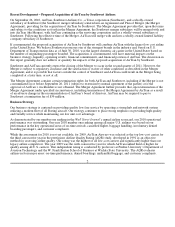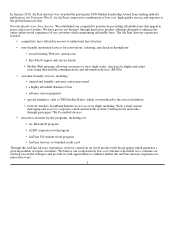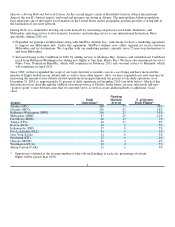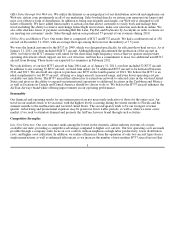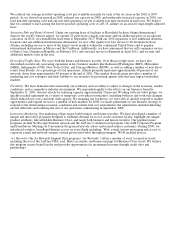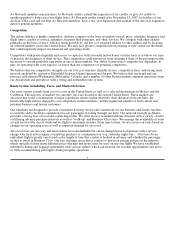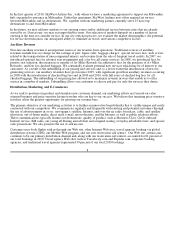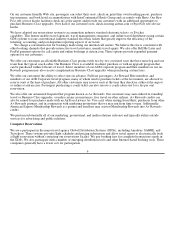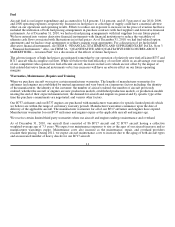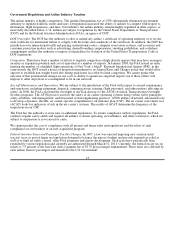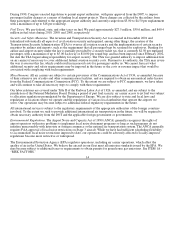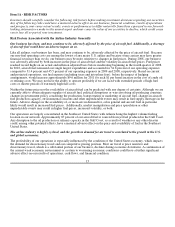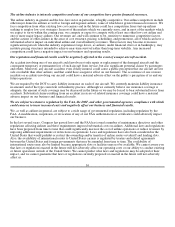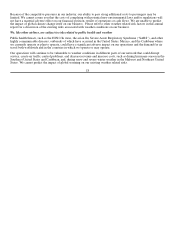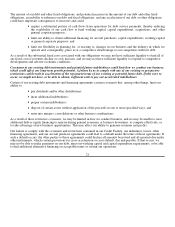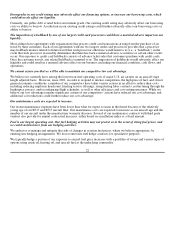Airtran 2010 Annual Report Download - page 20
Download and view the complete annual report
Please find page 20 of the 2010 Airtran annual report below. You can navigate through the pages in the report by either clicking on the pages listed below, or by using the keyword search tool below to find specific information within the annual report.
We believe the long-term cost of maintaining our aircraft will be within industry norms. However, we may be required to
comply with new FAA regulations or Airworthiness Directives that may be promulgated in the future and there can be no
assurance that we will not encounter unexpected maintenance expenses or that our maintenance expense will remain
within industry norms.
Aircraft airframe maintenance and repair consists of routine and non-routine daily maintenance, A Check and phase level
maintenance, and heavy maintenance checks. Routine and non-routine maintenance is performed in Atlanta, Orlando,
Baltimore, Milwaukee, Fort Lauderdale, Indianapolis, and Dallas by our employees and by qualified third party
contractors at the other cities we serve. Heavy B717 and B737 aircraft airframe maintenance is performed by FAA
approved third parties. Maintenance repair costs for major components on our aircraft, including engines, landing gear and
auxiliary power units (APUs), are covered under maintenance agreements with FAA approved repair stations.
Our maintenance technicians undergo extensive initial and on-going training to ensure safety of our aircraft. For 2009, we
received the FAA’s Air Maintenance Technical Diamond Certificate of Excellence for Maintenance Training, the FAA’s
highest maintenance award. This marked the fourteenth consecutive year we have received this award for exceeding the
required levels of safety training for our maintenance technicians.
In addition to core model specific training on each type of aircraft, AirTran Airways has initiated wiring, human factors,
and fuel tank safety specific training.
Insurance
We carry what we believe are customary levels of passenger-liability insurance, aircraft insurance for aircraft loss or
damage, war-risk insurance, and other business insurance. We also believe our insurance coverage in these areas is
adequate. We are exposed to potential catastrophic losses that may be incurred in the event of an aircraft accident. Any
such accident could involve not only repair or replacement of a damaged aircraft and the consequent temporary or
permanent loss of the original aircraft from service but also significant potential claims by passengers and others. We
currently maintain liability insurance in amounts and of the type which we believe are consistent with industry practice.
Although we currently believe our insurance coverage is adequate, there can be no assurance that the amount of such
coverage will not be decreased or that we will not be forced to bear substantial losses from accidents. Substantial claims
resulting from an accident in excess of related insurance coverage or not covered by our insurance could have a material
adverse effect on us. Congress passed the Homeland Security Act of 2002, which mandated the federal government to
provide third-party, passenger, and hull war-risk insurance coverage to commercial carriers through August 31, 2003.
Coverage under this Act has been extended and currently we have received certification of coverage through September
30, 2011.
Airport Operations
Ground handling services, provided by third parties, typically are of three types: above-wing only, under-wing only, and
complete ground handling. Above-wing services include, but are not limited to, passenger check-in, gate processing, and
baggage office services. Under-wing ground handling services include, but are not limited to, directing the aircraft into
and out of the gate, baggage loading and unloading, lavatory and water servicing, de-icing, and certain other services.
Complete ground handling consists of public contact (at the ticket counter, gate and baggage service office) and under-
wing services combined.
Using our employees, we conduct complete ground handling services at 31 airports, including Atlanta. At other airports,
the operations not conducted by our employees are contracted to other air carriers, ground handling companies, or fixed
base operators. We have employees at each of these cities to oversee our operations.
12


